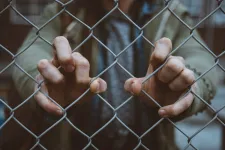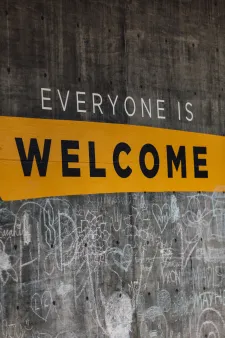Chutzpah: a Yiddish term for "audacity for good or for bad." As in, "Imagine the chutzpah he had to make that kind of journey." For me, that word describes anyone who would pack up their family and belongings, leave a possible generational homeland, and travel to a strange country (likely not even knowing the language and/or customs) for a better life. The words that come to mind are: immigrant, refugee, and expatriate. And they come in two tiers. The first are the ones that come without knowing anything; they settle, take the bad with the good and are literally pioneers. The second are the ones that follow, those sent for: wives, family, betrothed, or necessarily abandoned.
There are also those that come indentured: Asians, Europeans, and most notably Africans. They come, they're brought, they're sent for, and they endure. I'm a second generation American, so this seed has not fallen far from the tree; all four of my grandparents were not born here. They came for a better life—they came to escape poverty, violence, and oppressive politics. One of my grandmothers was sent for as a child bride. They brought their stories, customs, food, and languages; they had children and their children had children.
The pioneer that crosses the plains in a covered wagon is not much different than the refugee who travels in the bowels of a tramp steamer, crosses from the Caribbean in an inflatable raft, or trudges through the southern desert to Laredo, Texas. They "pays their money and they takes their chances." They endure—they endure because they have to or they'll perish. The generational endurance of the people that were kidnapped and enslaved is legendary and ongoing. The pioneers and the persecuted endure hardship, hunger, haranguing, hatred, and exploitation. They're cat-called with racial and ethnic slurs: kikes, rag heads, beaners, greasers, chinks, slopeheads, spics, and that n-word that we're not allowed to say or print. My own people were called micks, krauts, and wops.
Those that have been here for a few generations forget the fact their people once were immigrants and discourage this country from taking in "foreigners" (many "foreigners" want to come here) from places like Korea, Syria, Afghanistan, Haiti, Ethiopia, China, Nigeria, Cuba, Somalia, and parts of Eastern Europe—the big one these days is Latinos from South and Central America and, of course, those pesky Mexicans.

We hear: "The nerve of these people! They'll take our jobs, our women, our language, and our way of life. Our last president called them 'murderers and rapists.' Look out! They're coming across the border from the Middle East, Asia, Guatemala, and, hey, I hear that there are even some Canadians that want in. Well, not on my watch! I'll build a wall: a physical, social, and cultural wall. I'll build an economic wall against hiring in any but the lowest forms of employment: fruit pickers, factory workers, domestic workers, sweatshop workers. What(?), we've already done that? Whew, good, I'm safe now. I can sleep easier knowing that if those tired, poor, huddled masses yearning to breathe free, the wretched refuse from those teaming shores, tries to get into Little Tommy's play school or get a job in my local bank as anything but a janitor…"
In 1868, Africans that were brought here as slaves were granted citizenship. June 2, 1924, President Calvin Coolidge signed into law the Indian Citizen Act, which gave the people that had been here for millennium the right of American Citizenship. 1935, my grandparents became American citizens. Did that make their lives any easier? Ask them. The walls we built still stand.
It tears our hearts to see ragged malnourished kids, maimed puppies, or beaten horses. We cry for missing children, abandoned kittens, abused women, or those trafficked for pleasure or gain. As long as they don't move into our backyard. Tendency wants us to say: "I don't want a homeless shelter built in my neighborhood. I don't want anyone panhandling in front of that restaurant that I frequent. Make them all just go away. I'll feel sorry from a distance; I'll even donate. I know that we're all brothers, but I don't want my brother sleeping in that doorway; it's gross to look at. What will the children think?"

The secure have a tendency to get smug. Notwithstanding my white privilege, my people pulled themselves up by their bootstraps (we say), not realizing that some of our "brothers" have no bootstraps with which to pull. They're sitting at the border waiting for a shot at asylum, eating donated food and dirt.
I say let them all in; borders are imaginary lines in a global sandbox and it's usually the biggest bully that gets the best corner. I say we adopt the world and let all those that have less share our abundances. Put them to work, give them education, healthcare, and fair housing (you know, stuff that we are not making available to all of our own citizens).
The argument against that is, "We'll go into debt; our children will go into debt; our grandchildren will have to pay this off." That is the argument that comes from the financially secure politicians that already have comprehensive healthcare, paid holiday vacations, and free tuition for their children.
If you adopted a person, or even a critter, and they needed care and assistance, wouldn't you, out of love, go into debt? I would, and because of those types of Golden Rule values. I would pass that debt as well as that value to my children and my grandchildren. I would.
After all, if we happen to accrue debt helping those less fortunate by letting them into the American Dreamland, wouldn't we be passing that shared debt to their children and grandchildren? Think about that when you stop by that taco truck for a Carne Asada Burrito and ice cold Fanta—prepared by a future fellow citizen.

